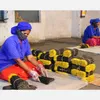How this bartending collective is rewriting the industry's status quo in India
Mr. Bartender and The Crew is a socially conscious initiative of teaching the art of bartending exclusively to women and members of the queer community.
Staying out all night, jamming to music while perfecting that one martini is something that Fay Barretto had yearned for as a bartender. In his decade-long career, he is no stranger to how women and the queer community are treated in the bartending industry.
Barretto recalls an incident in particular. While working in a pub in Bengaluru, he remembers getting irritated when he was misgendered by patrons and felt a lack of support from his co-workers. “If this is how it is to bartend, I don’t want to,” he says, recalling that memory.
Today, he is at the helm of Mr. Bartender and The Crew—which provides online training and employment opportunities to marginalised communities, and is focused on bringing an equitable representation of all genders in the industry. The crew also boasts a strong social media presence, which comprises just over 57,600 followers on Instagram, which has helped them in take the cause to the masses.

Fay Barretto along with his trainees at a training session (Credit: Fay Barretto)
In the beginning
The year 2020 was marked as one of the toughest periods for the hospitality business. Many people who worked in this industry found themselves out of work, as the country moved into rigid lockdowns. This was also around the time when Barretto went about gliding from gig-to-gig in Goa, although he knew he couldn’t do it alone.
He resorted to training his roommate and now Co-founder Daria Aria. Since the bartending industry has largely been male-dominated, he wanted to refrain from enrolling men in his collective and make the space more conducive to those from other communities.
“This collective was a movement to empower women and the LGBTQ+ members who lacked the support and bandwidth, rather than a business opportunity,” Barretto explains.
The online programme was a month-long training culminating in practical and theoretical sessions after which trainees were given help to secure gigs or were free to do something of their own. Post-pandemic, Mr. Bartender and The Crew have started with offline workshops in places like Bengaluru, Gurugram, Chandigarh, and Mumbai.

(Credit: Fay Barretto)
Today, the initiative has helped several people take their passion for bartending into a flexible career. Like in the case of Mumbai-based Devina Medda, a dentist, comedian, writer-actor, and director, who met Mr. Bartender and The Crew for a gig in Mumbai and have been working together since.
“Being a girl working in a bar is difficult. The taboo and misogyny are omnipresent in all professions, but it is also very much real behind bars. However, the most ironic part is the people commenting about you are the ones who are drinking at the bar while you are working hard for something you love to do,” she says.
Challenging the status quo
Being a trans man in India came with its own challenges, and for Barretto, challenging norms came very early. He was only 16 years old when he came out to his parents about his identity, which was not warmly welcomed by his family. This led him to move out of his house at a very young age.

Fay Barretto started the collective to empower women and queer community (Credit: Fay Barretto)
Since then, he has worked with people from across the world. This is when he realised that change in the industry was crucial, especially in circles dominated by Indian men.
“People come from different backgrounds, and many lack education. Such people are not sensitised towards working with those different from them,” says Barretto.
Now, he wants to tap into the grassroots level, spread awareness about bartending, and break the stereotype of women and queer community not being bartenders.
“Starting with small bar takeovers in Goa to training close friends, we are now working with the best brands and venues across India. The experience has been magical— from creating the menu, getting the whole bar together, exchanging experiences with the local bartenders, and making drinks for guests,” says Daria Arya, a mixologist and Co-founder of Mr. Bartender and The Crew.
The collective is now looking to train victims of human trafficking and slum dwellers to create better livelihood opportunities. Along with holding offline training sessions, it also focuses on conducting sensitisation workshops to make the industry more inclusive for the LGBTQIA+ community.
“It takes one person to change the mindset, and that is where you start,” says Barretto.
Edited by Akanksha Sarma







